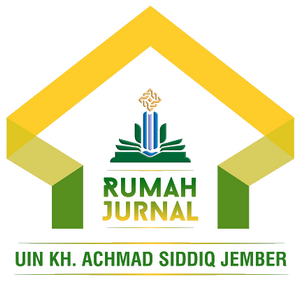Implementation Of Gender Equality Education In The Boarding School Tarbiyatul Mu'allimat Al-Islamiyah Al-Amien Prenduan Sumenep
DOI:
https://doi.org/10.35719/ijibs.v1i2.25Education and pesantren are two parts that cannot be separated for the survival of the students. One of the bad stigmas among society is that a woman is marginalized by men, so there are many cases of harassment or even violence against a woman. With the existence of islamic boarding schools in Indonesia, it turns out that it has a change in the order of society to raise the degree of women in Indonesia. That men are now also activists to maintain the existence of a woman. The existence of this islamic boarding school provides a solution to raise the degree of a woman because in pesantren today it has taught several skills and education based on gender equality education. Thus, female students can grow and develop with confidence to defend themselves to be able to compete with a man. In this study, researchers used a qualitative field approach with a type of case study research. While the method in collecting data, researchers use three methods, namely observation, interview and documentation. Meanwhile, the data analysis technique is through data reduction, data exposure and data verification. The form of implementation of gender equality education management applied in tarbiyatul mu'allimat al-islamiyah is leadership and management training, worksop improvement of group leaders and organizational skills among female students while the advantage of this implementation is the confidence of each student to be able to compete with a man and have a trustworthy and honest leadership spirit. Meanwhile, the drawback is that there are some students who are indifferent in carrying out and implementing the discipline of islamic boarding schools that have been mutually agreed upon, both kyai, teachers and students.
References
Husaini, Adian, and Rahmatul Husni. “PROBLEMATIKA TAFSIR FEMINIS : Studi Kritis Konsep Kesetaraan Gender.” Al-Tahrir 15, no. 2 (2015): 367–88.
Iwan Kuswandi, Ihwan Amalih. KH. Muhammad Idris Jauhari Sang Konseptor Pendidikan. Yogyakarta: Ladang Kata, 2015.
Kemas Badarudin. Filsafat Pendidikan Islam. Yogyakarta: Pustaka Pelajar, 2009.
Lexy J. Moleong. Metodologi Penelitian Kualitatif. Bandung: Remaja Rosdakarya, 2005.
Mansour Fakih. Membincang Feminisme Diskursus Gender Perspektif Islam. Surabaya: Risalah Gusti, 1996.
Muhammad Idris Jauhari. Pondok Pesantren Al-Amien Dalam Lintas Sejarah. Sumenep: Al-Amien Printing, 1997.
Observasi Pondok Pesantren Al-Amien. “Kegiatan Belajar Para Santri.” 2021.
Rustan Efendy. “Kesetaraan Gender Dalam Pendidikan.” Jurnal Al-Maiyyah 07, no. 2 (2014): 142–65.
Sugiyono. Metodologi Penelitian Pendidikan Kuantitatif-Kualitatif Dan R&D. Bandung: Alfabeta, 2010.
Suharsimi Arikunto. Prosedur Penelitian Suatu Pendekatan Praktek. III. Jakarta: Rineka Cipta, 2000.
Towaf, Siti Malikhah. “Peran Perempuan, Wawasan Gender Dan Im- Plikasinya Terhadap Pendidikan Di Pesantren.” Jurnal Ilmu Pendidikan 15, no. 6 (2008).
Umar, Nasaruddin. Argumen Kesetaraan Gender. Jakarta: Paramadina, 1999.
Wahyuddin. “Implementasi Nilai Kesetaraan Jender Dalam Pendidikan Karakter (Studi Terhadap Pondok Pesantren DDI Mangkoso Dan Ummul Mukminin Di Sulawesi Selatan).” Jurnal Ushuluddin: Media Dialog Pemikiran Islam 21, no. 02 (2017).
Wawancara bersama Muhdlar Ali Wafa. “Sistem Pendidikan Di Pesantren Al-Amien Prenduan.” 2021.
Wiwin, Warliah. “Pendidikan Berbasis Gender Awareness; Strategi Meminimalisir Bias Gender Di Pondok Pesantren.” Jurnal Islam Nusantara 01, no. 02 (2017).
Downloads
Published
Issue
Section
License
Copyright (c) 2023 Andri Sutrisno, Iwan Kuswandi

This work is licensed under a Creative Commons Attribution-NonCommercial 4.0 International License.
License
1. Author’s Warranties
The author warrants that the article is original, written by stated author/s, has not been published before, contains no unlawful statements, does not infringe the rights of others, is subject to copyright that is vested exclusively in the author and free of any third party rights, and that any necessary written permissions to quote from other sources have been obtained by the author(s).
2. Miscellaneous
IJIBS will publish the article (or have it published) in the journal if its editorial process is successfully completed and IJIBS or its sublicensee has become obligated to publish it. IJIBS may conform the article to a style of punctuation, spelling, capitalization, and usage that it deems appropriate.

















 IJIBS licensed under Creative Commons Attribution-NonCommercial 4.0 International License.
IJIBS licensed under Creative Commons Attribution-NonCommercial 4.0 International License.